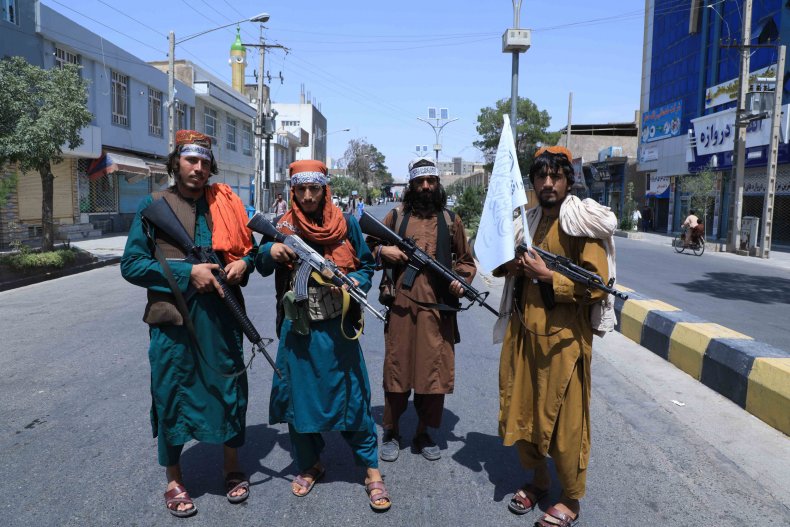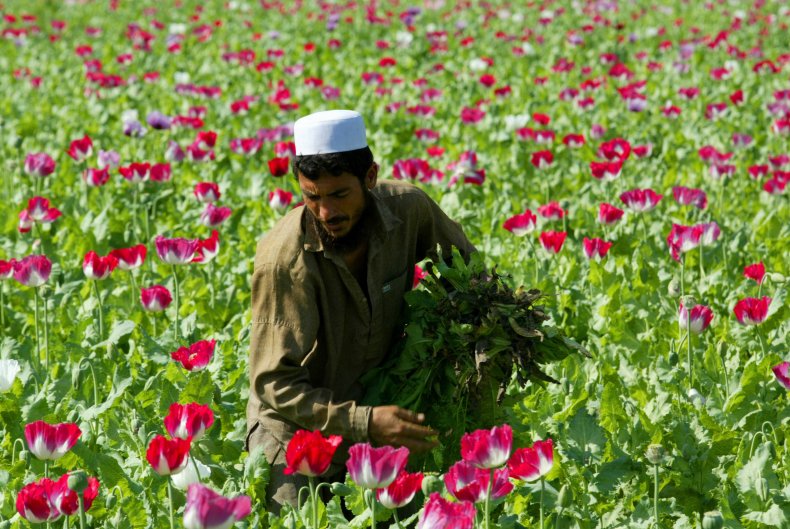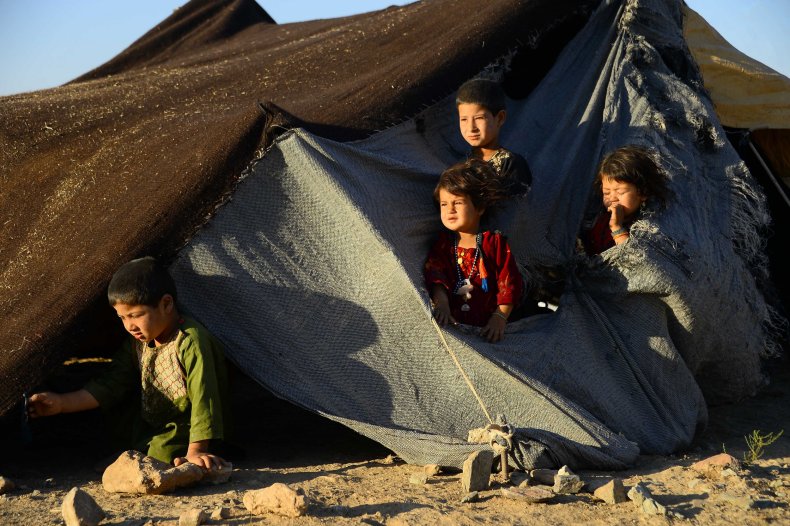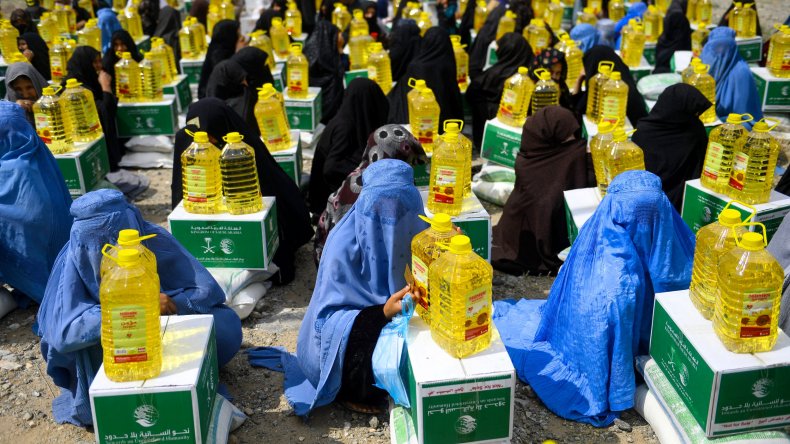How Has the Us Continued to Lead Humanitarian
The scene of thousands of Afghans rushing the tarmac in Kabul on Monday painted an image of fear and desperation around what a new Afghanistan under Taliban rule may look like. A recent video surfaced online of a young Afghan woman begging U.S. troops for help. Isolated reporting has detailed incidents of women being forced from their jobs and beaten in the streets.
Between 1996 and 2001, the Taliban upheld its grip over the country through high-profile exercises in violence. Women accused of adultery were stoned in public. Education and work were barred for women, and those accused of running underground girl's schools were killed.
House Speaker Nancy Pelosi cites the fear surrounding a return to this society as a reason for the continued support for the United States' presence in the region over the last 20 years. However, in a recent press conference, the Taliban's longtime spokesman, Zabihullah Mujahid, said the group would "allow women to work and study," seemingly backing his promise by allowing female reporters to attend the conference.
Mujahid declared there "there will be no discrimination against women" and "difference when it comes to the actions we are going to take" compared to 20 years ago. He promised that "women are going to be very active in the society but within the framework of Islam," and therein that statement lies the potential issue: The Taliban does not have a consistent view on what the "framework of Islam" entails.

"Look at our own situation here in the U.S. and look at Democrats and Republicans—each one has its own factions," Jeff Bardin, a former Air Force Arabic linguist and chief intelligence officer of Treadstone 71, a cyber intelligence company, told Newsweek. "The Taliban are kind of the same way."
Within the Taliban, Bardin explained there are factions that hold different viewpoints on what the new government should look like, ranging from moderate to extreme in their interpretation of Sharia Law, the code of Islamic rule that is derived from the Quran. Right now, public messaging has come from the Taliban's moderate wing. However, Bardin said, the extreme factions are currently heading to Kabul from their base in the southern city of Kandahar.
Bardin believes some strain could emerge within the group as the factions sit down to discuss the future of the country. Already, reports have indicated a potential split amongst these factions. The Times of India, an Indian English-language newspaper, shared a video allegedly showing the public execution of four Afghan soldiers at the hands of the Taliban members in a Kandahar sports stadium. While Newsweek could not verify the context behind this video, its circulation furthers the uncertainty surrounding how the new government may act.
With these Taliban factions scattered across Afghanistan, neighboring countries with varying agendas could divide the groups' interests, opening the door for a rise in terrorism. Bardin said some factions are linked to ISIS and have rebranded themselves as Taliban. He cited this as a potential cause for infighting, one he thinks could be heightened as the groups run out of money.

Afghanistan produces roughly 90 percent of the world's heroin, according to the U.S. military. U.N. officials reported that the Taliban likely earned more than $400 million in the year prior to the pandemic through this trade. A May 2021 U.S. Special Inspector General for Afghanistan report quoted a U.S. estimate speculating that the group earned up to 60 percent of its annual revenue through the trade. However, Mujahid said drugs will no longer be cultivated under Taliban rule. The southern region near Kandahar, an area where corn has failed to grow, produces the bulk of heroin crops.
"I just can't see the real hardliners accepting everything at the moderates want to go forward," Bardin said. "I think humanitarian issues will occur when they realize that they don't have money."
The International Rescue Committee (IRC) reports that the socio-economic impacts of COVID-19 have resulted in "dramatic" food insecurity that has pushed levels to that seen during Afghanistan's 2018 drought when roughly 250 million people were displaced. As the nation grapples with its current drought, the organization estimates 18.4 million people now require humanitarian assistance, doubling since last year. The IRC also found that 75 percent of those interviewed reported rising conflict in areas with depleted water, and 98 percent of people noticed a rapid increase in food prices.
Ciaran Donnelly, the IRC's senior vice president of crisis response and recovery, told Newsweek that the longer economic uncertainty continues, the more vulnerable the country's citizens will become. As banks and markets remain closed, ordinary Afghans continue to suffer, Donnelly said. This situation comes as the number of civilian casualties hits record levels in the first half of 2021, rising by more than 70 percent increase between May and June during the time of the U.S. withdrawal.

"If that continues to worsen, the level of humanitarian need is going to continue to exceed the abilities of organizations like IRC," Donnelly said. "Any consideration of sanctions really needs to make a provision for humanitarian exceptions, humanitarian carve-outs, making sure that organizations like IRC and others working to reach vulnerable Afghan communities are able to continue operating without interference."
The Biden administration recently froze billions of dollars in Afghan currency reserves held in U.S. bank accounts which could further squeeze the country's already fragile economy. It remains to be seen if further sanctions will be applied. If these sanctions are put in place and the situation worsens, the IRC will act.
Donnelly said the IRC has had a presence in the region since 1988 and, along with providing humanitarian assistance, has worked with communities to offer schooling for girls and women's medical aid. However, right now, like many in the country, the IRC is waiting to see what the future has in store. With the Taliban's moderate and extreme factions set to convene, the organization could soon have its answer.
"There's a real sense of just not knowing what's coming, not knowing what the rules will be for social interactions for professional interactions, and I think that uncertainty is in many ways is what's driving a lot of the anxiety that people are experiencing," Donnelly said. "I think we're very much in a transitional phase, and in many ways that kind of influences how I think a lot of us are acting over the moment. It's a wait-and-see moment to determine what the new reality is going to be."

Source: https://www.newsweek.com/infighting-among-taliban-could-lead-humanitarian-abuse-reign-terrorism-1621214
0 Response to "How Has the Us Continued to Lead Humanitarian"
Post a Comment